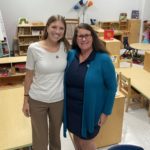How NC, and other states, are filling early childhood gaps
Early Bird readers, hello again. Newcomers, welcome! If you were forwarded this email, you can sign up here to receive it every two weeks, and join our conversation on issues facing North Carolina’s young children and those who support them. If you’re already a subscriber, please help us reach more people by sharing this with your friends and co-workers interested in early childhood education.
A special thank you to the early childhood faculty taking time to meet with EdNC as we visit all 58 community colleges and ask questions about early care and education in their communities. I’m taking selfies with the rock stars I’m meeting, like the ones above with Sheila Regan at Richmond Community College and Katie Mintz at Brunswick Community College.
Regan talked about the difference that supportive leadership makes and strategies to strengthen the local landscape, and Mintz shared how her program has seen a large enrollment uptick over the last year. She’s still trying to understand why.
From Martin County…
Be on the lookout for stories about the trends we’re discovering and the people we’re meeting, like this one from EdNC reporter Cheyenne McNeill on Tonya Staton, owner of N.C. Open Arms Childcare in Robersonville.
Staton was able to find support from Martin Community College’s Small Business Center to buy and open the center where she previously taught. The program is filling a dire need in the community for early care and education, McNeill reports.
At the state level…
The Department of Health and Human Services announced it would continue compensation supports for early childhood programs through December 2023. This extends relief funding that programs have accessed since last November through federal stabilization grants.
The funds come from another discretionary pot of federal relief that DHHS decided would be helpful for programs increasing wages with temporary money. Susan Gale Perry, DHHS chief deputy secretary for opportunity and well-being, said in a statement that this is a step in acknowledging the important work of early childhood educators.
“At the same time, we can’t rely on temporary solutions; we need long-term investment to strengthen the early care and learning workforce and ensure access to high quality care,” she said. “This workforce is fundamental to our economy and foundational to the well-being of children and families.”
Elsewhere…
EdNC spoke with the early learning team at the Hunt Institute, who recently hosted the largest convening in the history of the organization. State policymakers and officials from all 50 states, plus Washington, D.C., and Puerto Rico, gathered to discuss early childhood policy.
I outlined their main takeaways — like the distinctively bipartisan nature of early childhood support — as well as trends in state policy they’re paying attention to.
Below, don’t miss research on Hispanic families’ access to child care subsidy in North Carolina, and early childhood news from across the country. Thanks for reading.
Early Bird reads: What we’re writing
What can North Carolina learn from early childhood trends across the country?
Here’s what the early learning team at the Hunt Institute — which provides education and resources for state policymakers — had to say about early childhood policy trends across the country:
- Without anticipated federal investments, states can play a critical role.
- In a polarized climate, early childhood is distinctively bipartisan.
- Rethinking child care subsidy is key, and is happening in many states (including North Carolina).
- It all comes down to finding qualified teachers, which is a struggle everywhere.
Child care center opens thanks to help from Martin Community College Small Business Center
“Tonya Staton (owner of N.C. Open Arms Childcare in Robersonville) said it was Charles Banks and Lena Jackson at the Martin Community College Small Business Center who provided her with the information and resources to buy the building,” Cheyenne McNeill reports.
“She said the resources the center provided, plus her family support, helped kick start the dream she had.
“‘I stepped out on faith and went in that direction,’ Staton said.”
Q&A | Jennifer Lansford, director of Duke’s Center for Child & Family Policy
In case you missed it, early childhood policy analyst Katie Dukes spoke with the new director of Duke University’s Center for Child & Family Policy, Jennifer Lansford, about her priorities going forward and her thoughts on how the state can do better in its supports of young children and families.
“I think a big question is how to build systems of care,” Lansford said when Dukes asked about child care supports. “If I were going to design an optimal system to avoid things like the child care cliff, it would start with universal paid parental leave.”
DHHS extends early childhood teacher compensation supports through end of 2023
Early care and education programs in North Carolina will not face as steep a cliff when federal stabilization grant funds run out next year. The state Department of Health and Human Services has decided to provide $150 million for programs to support teacher compensation through December 2023.
Since last fall, DHHS’s Division of Child Development and Early Education (DCDEE) has distributed $655 million in grants to 4,247 centers and home-based providers from the federal American Rescue Plan Act.
Your take, for goodness sake: EdNC perspectives
Perspective | How government chipped away at child poverty
EdNC board member Ferrel Guillory unpacks recent reports from the U.S. Census Bureau on economic well-being of families.
“The data provide evidence that recent direct assistance and tax policies have made a difference in the lives of millions of hard-pressed families,” Guillory writes.
“In reporting on child poverty, the Census Bureau used two calculations – the official poverty measurement based simply on cash income and the supplemental poverty measurement that takes into account housing subsidies, SNAP food assistance, and such.
“By the standard measure, child poverty declined modestly from 16% to 15.3%. By the supplemental measure, says the Census, child poverty ‘fell to its lowest recorded level in 2021, declining 46% from 9.7% in 2020 to 5.2% in 2021.'”
In other early learning news: What I’m reading
What’s next for child care after Senate bailed on reforms - From The Hechinger Report
'Child care is a huge barrier': $167K approved to fund free daycare for children of Durham Tech students - From WRAL
Covering child care costs could help employers find workers. A new state grant program looks to test it. - From Wisconsin Public Radio
Many Early Childhood Educators Will Have Debt Forgiven Under Biden’s Plan. But How Much Will It Help? - From EdSurge
Low pay for child care teachers raises alarms: 'These are certainly grim statistics' - From Nola.com
What’s driving teachers to expel students from preschool and daycare? - From WBEZ Chicago
Research & Resources: Let's talk Hispanic families accessing child care subsidy
Help paying for child care could be more accessible to North Carolina Hispanic families, according to a new research brief from the National Research Center on Hispanic Children & Families.
The researchers surveyed the administrative staff on their practices in interacting with families looking to access child care subsidy funds. There are certain practices, like requesting more documents than are required in state policy, that the researchers found could “create a more restrictive environment” for Hispanic families and increase administrative burden.
About 5 percent of staff described themselves as fluent in Spanish, while more than half of staff members said there were resources and information on the program available in Spanish.
Respondents’ understanding of the program weren’t always aligned with state policy, the research found. Not all (60-70% of respondents) considered job search and activities related to the Supplemental Nutrition Assistance Program (SNAP) to be qualifying factors for subsidy assistance (which they are in state policy).
Go here for more on the researchers’ findings, and here for the full report.
Sign up for Early Bird, our newsletter on all things early childhood.



